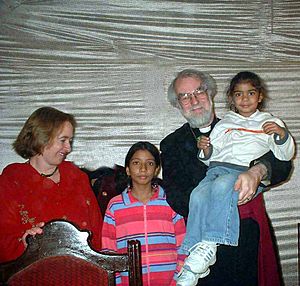Rowan Williams facts for kids
Quick facts for kids The Lord Williams of Oystermouth |
|
|---|---|
| Former Archbishop of Canterbury | |
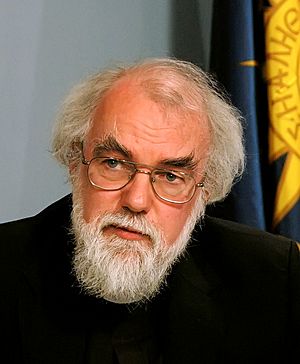
Williams in 2007
|
|
| Church | Church of England |
| Province | Canterbury |
| Diocese | Canterbury |
| Elected | 2 December 2002 |
| Enthroned | 27 February 2003 |
| Reign ended | 31 December 2012 (retired) |
| Predecessor | George Carey |
| Successor | Justin Welby |
| Other posts | Archbishop of Wales (2000–2002) Bishop of Monmouth (1992–2002) |
| Orders | |
| Ordination | 2 October 1977 (deacon) by Eric Wall 2 July 1978 (priest) by Peter Walker |
| Consecration | 1 May 1992 by Alwyn Rice Jones |
| Personal details | |
| Birth name | Rowan Douglas Williams |
| Born | 14 June 1950 Swansea, Glamorgan, Wales |
| Denomination | Anglicanism |
| Parents |
|
| Spouse |
Jane Paul
(m. 1981) |
| Children | 2 |
| Profession | Archbishop, theologian |
| Alma mater | |
| Motto |
|
| Signature | |
| Coat of arms | |
Rowan Douglas Williams (born 14 June 1950) is a Welsh Anglican bishop, theologian, and poet. He served as the 104th Archbishop of Canterbury from 2002 to 2012. The Archbishop of Canterbury is the leader of the Church of England and the worldwide Anglican Communion.
Before becoming Archbishop of Canterbury, Williams was the Bishop of Monmouth and Archbishop of Wales. He was the first person in modern times to be chosen for the role from outside the Church of England.
His time as archbishop was challenging. The Anglican Communion faced disagreements on modern social issues. Williams worked hard to keep all sides talking to each other. After retiring as archbishop, he became the Master of Magdalene College, Cambridge, and a member of the House of Lords.
Contents
Early Life and Education
Rowan Williams was born on 14 June 1950, in Swansea, Wales. He grew up in a family that spoke the Welsh language. He went to Dynevor School, Swansea, and then studied theology at Christ's College, Cambridge. He did very well in his studies.
Later, he went to Wadham College, Oxford, where he earned a Doctor of Philosophy degree in 1975. His studies focused on the ideas of a Russian theologian named Vladimir Lossky.
Career as a Priest and Bishop
After his studies, Williams began training to become a priest. He taught theology at a college in Cambridge and was ordained as a priest in 1978. He also served as a chaplain at Clare College, Cambridge.
At the young age of 36, he became a professor of theology at the University of Oxford. This was a very important job for a scholar.
In 1991, Williams was chosen to be the Bishop of Monmouth in the Church in Wales. He was officially made a bishop in 1992. In 1999, while still serving as Bishop of Monmouth, he was also elected Archbishop of Wales.
Archbishop of Canterbury
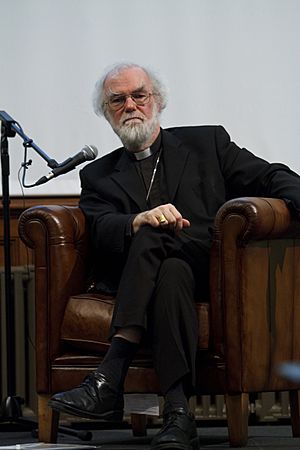
In 2002, Rowan Williams was named the next Archbishop of Canterbury, following George Carey. This was a big step, as he was the first archbishop in centuries to be appointed from outside the Church of England. He was officially enthroned, or put into his new role, at Canterbury Cathedral on 27 February 2003.
As archbishop, Williams was seen as someone who could explain Christian ideas to people who were not religious. However, his time in office was marked by serious disagreements within the Anglican Communion. Churches around the world had different views on modern topics. Williams's main goal was to prevent the church from splitting apart.
Keeping the Church Together
To help solve the disagreements, Williams created a group called the Lambeth Commission. In 2004, this group produced the Windsor Report. The report suggested that all Anglican churches agree to an "Anglican Covenant." This was a promise to talk with each other before making big decisions. The idea was to keep the worldwide church connected.
In a speech to the Church of England's General Synod in 2010, Williams warned that these arguments could lead to a split. He asked everyone to focus on their shared mission instead of their differences.
Important Events
During his time as archbishop, Williams was involved in many national events. In 2005, he led a service of blessing for Prince Charles and Camilla Parker Bowles after their wedding.
On 29 April 2011, he officiated at the wedding of Prince William and Catherine Middleton. He also attended a special service at Westminster Abbey to celebrate the 400th anniversary of the King James Bible, along with Queen Elizabeth II and other members of the Royal Family.
Life After Canterbury
Williams retired as Archbishop of Canterbury at the end of 2012. He was succeeded by Justin Welby. After retiring, he was made a life peer, which means he became a member of the House of Lords with the title Baron Williams of Oystermouth. This allowed him to continue to share his views on important issues.
He also returned to academic life. From 2013 to 2020, he was the Master of Magdalene College, Cambridge. He also became the chancellor of the University of South Wales. In 2020, he retired from these roles and returned to live in Wales.
Personal Life and Talents
In 1981, Williams married Jane Paul, who is also a writer and theologian. They have two children.
Williams is known for his amazing language skills. He can speak or read at least eleven languages, including Welsh, Russian, French, German, Latin, and Greek. He learned Russian so he could read the books of the famous author Dostoevsky in their original language.
He is also a respected poet and has published collections of his poems. His writing often explores themes of faith and nature.
Social and Political Views
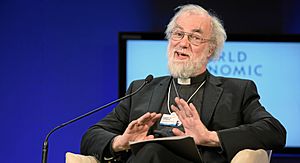
Throughout his life, Williams has been interested in social issues. In the 1980s, he took part in protests against nuclear weapons.
He has often spoken about economic fairness. He supported the Robin Hood tax campaign, which aimed to tax banks to help people in need. He believes that economies should serve all people, not just private interests.
Williams was strongly against the Iraq War. In 2002, he signed a petition arguing that the war was against Christian teaching. He also wrote a letter to Prime Minister Tony Blair expressing deep concern about the actions of troops in Iraq.
Working with Other Faiths
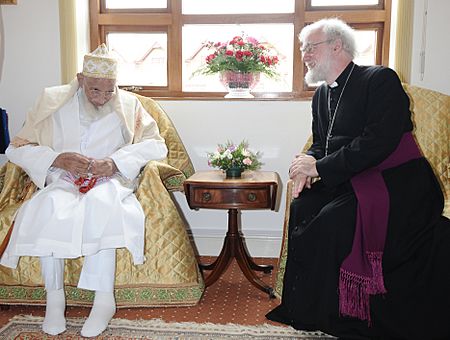
Williams has worked hard to build friendships between different religions. He has met with Muslim and Hindu leaders to promote understanding and cooperation.
In 2008, he visited a Hindu temple in the West Midlands. In 2010, he met with an Indian Islamic leader in London. They planted a "tree of faith" to show the common ground between Christianity and Islam.
He has also worked closely with the Russian Orthodox Church and has great respect for its traditions. He was the first Archbishop of Canterbury since the 1500s to attend a Pope's funeral when he went to the funeral of Pope John Paul II.
See also
 In Spanish: Rowan Williams para niños
In Spanish: Rowan Williams para niños
 | Mary Eliza Mahoney |
 | Susie King Taylor |
 | Ida Gray |
 | Eliza Ann Grier |


